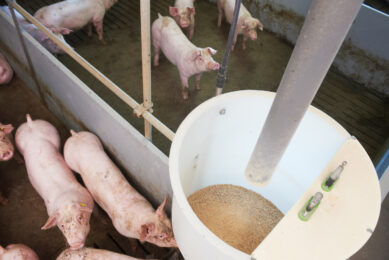Additives from the future
We are all aware of the merits and benefits of traditional additives like antibiotics, zinc oxide, and organic acids. But, what about new additives that have already been developed or being developed right now?
Some new exciting additives are entering the market and their effect on piglet performance and health is carefully scrutinized by the industry. Here are some additives that have attracted my attention. Feel free to contribute your findings!
1.©Egg Immunoglobulins
This is perhaps the most well researched and established ‘new’ additive. Egg powder from hens hyper-immunized against piglet specific pathogens are a sophisticated source of immunoglobulins.© Research has demonstrated that piglets infected with various pathogens and then fed with egg immunoglobulins recover faster and with less loss of performance than unsupplemented piglets. In addition, recent trials has provided evidence that egg immunoglobulins are also effective in relatively healthy animals as a plasma replacement in promoting growth.
2.©Nucleotides
This is a product with a good theory but still limited practical evidence and application. Although there is no established ‘requirement’ for nucleotides, perhaps because natural ingredients supply sufficient quantities, some research has demonstrated that under certain conditions recently weaned pigs may actually benefit from dietary supplementation of nucleotides. Unfortunately, most of this research is unpublished.© Although these first results are encouraging, it still remains to be clarified why piglets respond to nucleotide supplementation (mode of action) and under which circumstances (mode of use).
3.© Lysozyme and Lactoferrin
Both are natural components with strong antimicrobial properties. It is believed both compounds are natural bacteriocides and one of nature’s way of protecting suckling piglets from invading pathogenic microorganisms. Furthermore, lysozyme has an anti-inflammatory activity that could possible be of benefit in piglets receiving high-soybean meal diets that are known to cause digestive inflammation, but this deserves further investigation. Commercial production of these additives is still in experimental stages and because of that their cost is quite prohibitive for practical applications.
4.©Macrophages
This is perhaps the most recently developed technology at the moment but its potential is dramatic and might be the future answer to many diseases in pig production. Macrophages are natural components of the organism’s innate immune system. Today, experimental batches of macrophages have been produced for use in animal tests with very good results. In a recent study, the macrophages replicated rapidly in the digestive system and helped reduce the effect of experimental infection (E. coli 0149) in pigs weaned at three weeks of age.
5.©Antimicrobial Peptides: Potamin-1
Recently, a special variety of potatoes (Gogu valley) has been shown to contain high concentrations of Potamin-1. This is a small peptide with antimicrobial properties.© In vitro studies have clearly demonstrated this effect, with in vivo trials with piglets supporting the theory. Piglets fed with potato protein containing high levels of Potamin-1 had higher growth performance and enhanced gastrointestinal health. Clearly, something that merits further investigation!











